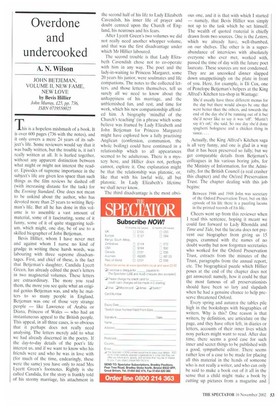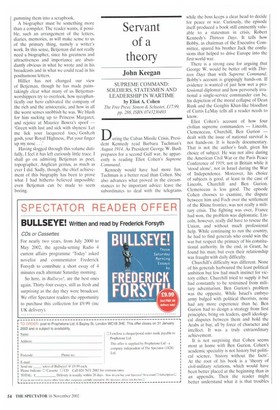Overdone and undercooked
A. N. Wilson
JOHN BETJEMAN, VOLUME II, NEW FAME, NEW LOVE by Bevis Hillier John Murray, £25, pp. 736, ISBN 0719550025 his is a hopeless mishmash of a book. It is over 600 pages (736 with the notes), and it only covers a mere 24 years of its subject's life. Some reviewers would say that it was badly written, but the trouble is, it isn't really written at all. It is hurled together, without any apparent distinction between what might or might not interest the reader. Episodes of supreme importance in the subject's life are given less space than such things as the film reviews he dashed off (with increasing distaste for the task) for the Evening Standard. One does not mean to be unkind about the author, who has devoted more than 25 years to writing Betjman's life. But all he has done in this volume is to assemble a vast amount of material, some of it fascinating, some of it funny, some of it of quite staggering tedium, which might, one day, be of use to a skilled biographer of John Betjeman.
Bevis Hillier, whom I have never met and against whom I nurse no kind of grudge in writing these harsh words, was labouring with three supreme disadvantages. First, and chief of these, is the fact that Betjeman's daughter, Candida Lycett Green, has already edited the poet's letters in two magisterial volumes. These letters are extraordinary. The more you read them, the more you see quite what an original genius Betjeman was, and why he matters to so many people in England. Betjeman was one of those very strange people — like Lawrence of Arabia or Diana, Princess of Wales — who had an instantaneous appeal to the British people. This appeal, in all three cases, is so obvious that it perhaps does not really need analysing. The letters merely add to what we had already discerned in the poetry. If the day-to-day details of the poet's life interest us, and if we want to know who his friends were and who he was in love with (for much of the time, endearingly, these were the same) you have only to read Mrs Lycett Green's footnotes. Rightly is she called Candida, for the story is frankly told of his stormy marriage, his attachment in
the second half of his life to Lady Elizabeth Cavendish, his inner life of prayer and doubt centred upon the Church of England, his neuroses and his fears.
After Lycett Green's two volumes we did not really need another whopper volume, and that was the first disadvantage under which Mr Hillier laboured.
The second trouble is that Lady Elizabeth Cavendish chose not to co-operate with him in any way. The poet and the lady-in-waiting to Princess Margaret, some 20 years his junior, were soulmates and life companions. The notes to the collected letters, and those letters themselves, tell us surely all we need to know about the unhappiness of his marriage, and the unblemished fun, and rest, and time for work, which his new companionship afforded him. A biography 'mindful of the Church's teaching' (in a phrase which some believe was framed by Lady Elizabeth and John Betjeman for Princess Margaret) might have explored how a fully practising Anglican (confession, communion, the whole boiling) could have continued in a relationship which to all appearances seemed to be adulterous. There is a mystery here, and Hillier does not, perhaps cannot, explore it. One explanation might be that the relationship was platonic, or, like that with his lawful wife, all but platonic. In Lady Elizabeth's lifetime we shall never know.
The third disadvantage is the most obvi ous one, and it is that with which I started — namely, that Bevis Hillier was simply not up to the task which he set himself. The wealth of quoted material is chiefly drawn from two sources. One is the Letters, which we already have, well-thumbed, on our shelves. The other is in a superabundance of interviews with absolutely everyone who ever met, worked with, passed the time of day with the future poet laureate. These sources are not condensed. They are an uncooked dinner slapped down unappetisingly on the plate in front of you. Here, for example, is Di Cox, one of Penelope Betjeman's helpers at the King Alfred's Kitchen tea-shop in Wantage:
She'd usually have three different menus for the day but there would always be one that went better than the others, and towards the end of the day she'd be running out of it but she'd never like to say it was 'of'. 'Mustn't say it's orf,' she said. So one day she'd done spaghetti bolognese and a chicken thing in sauce....
Actually, the King Alfred's Kitchen saga is all very funny, and one is glad in a way that it has been preserved so fully; but we get comparable details from Betjeman's colleagues in his various boring jobs, for the Ministry of Information, for the Admiralty, for the British Council (a real crasher this chapter) and the Oxford Preservation Trust. The chapter dealing with this job begins:
Between 1946 and 1948 John was secretary of the Oxford Preservation Trust, hut on this episode of his life there is a puzzling lacuna in the printed records of his life.
Cheers went up from this reviewer when I read this sentence, hoping it meant we could fast forward to Lady Rhondda and Time and Tide, but the lacuna does not prevent our biographer from giving us 15 pages, crammed with the names of no doubt worthy but now forgotten secretaries who worked for the Oxford Preservation Trust, extracts from the minutes of the Trust, paragraphs from the annual report, etc. The biographical puzzle which Hillier poses at the end of the chapter does not get answered: namely, how it could be that the most famous of all preservationists should have been so lazy and slapdash when he had a genuine chance to help preserve threatened Oxford.
Every spring and autumn the tables pile high in the bookshops with biographies of writers. Why is this? One reason is that writers, by definition, are articulate on the page, and they have often left, in diaries or letters, accounts of their inner lives which nosy parkers might want to read. After due time, there seems a good case for such inner and secret things to be published with a good, sympathetic editor. There seems rather less of a case to be made for placing all this material in the hands of someone who is not really a writer, and who can only be said to make a book out of it all in the sense that a child might make a book by cutting up pictures from a magazine and
gumming them into a scrapbook.
A biographer must be something more than a compiler. The reader wants, if possible, such an arrangement of the letters, diaries, memories, as will make sense to us of the primary thing, namely a writer's work. In this sense, Betjeman did not really need a biographer, since his greatness and attractiveness and importance are abundantly obvious in what he wrote and in his broadcasts and in what we could read in his posthumous letters.
Hillier has not changed our view of Betjeman, though he has made painstakingly clear what many of us Betjemanworshippers try to overlook, how sycophantically our hero cultivated the company of the rich and the aristocratic, and how in all the worst senses snobbish he was. We blush for him sucking up to Princess Margaret, and rejoice at Maurice Bowra's spoof — 'Green with lust and sick with shyness/ Let me lick your lacquered toes,/ Gosh,oh gosh, your Royal Highness, /Put your finger up my nose ...'
Having slogged through this volume dutifully, I feel it has left curiously little trace. I shall go on admiring Betjeman as poet, topographer, Anglican genius, as much as ever I did. Sadly, though, the chief achievement of this biography has been to prove what I had hitherto believed impossible: even Betjeman can be made to seem boring.



























































































 Previous page
Previous page